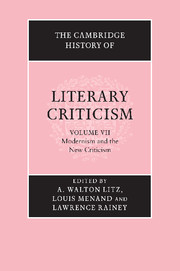3 - Gertrude Stein
from THE MODERNISTS
Published online by Cambridge University Press: 28 March 2008
Summary
‘It is necessary that there is stock taking. If there is such necessity, can we critically abandon individualism. One cannot critically abandon individualism. One cannot critically realise men and women.’
Though all literary criticism may be read as implicit commentary on the writer's own practice, Gertrude Stein's is especially self-regarding, always explicitly about her compositional practices. Even the pleasure she takes in viewing paintings, the subject of the least ostensibly literary of her Lectures in America (1935), proves inseparable from her writing. Paradoxically, this is because the two complementary forms of experience do not over lap; every one, Stein declares at once grandly and tentatively, ‘is almost sure to really like something outside of their real occupation’, and in her case ‘looking at pictures’ is ‘the only thing’, apart from her ‘real’ occupation, writing, which she ‘never get[s] tired of doing’. Such self-reflexivity, typical of modernist poetry and fiction yet fairly exceptional in twentieth-century criticism, should not be dismissed as a sign of self-indulgence. Instead, Stein's multiple accounts of herself writing, and of her writing self, form a trenchant critique of the idealist assumptions which continued to operate in the critical writing of her modernist contemporaries, despite being called into question by their creative work.
Hence, when her concerns become expressly literary near the end of ‘Pictures’, the contrast she makes between the ‘literary ideas’ of painters and those of writers directly leads to a dismissal of that staple of literary criticism, ‘the writer's idea’: ‘Of course the best writers that is the writers who feel writing the most as well as the best painters that is the painters who feel painting the most do not have literary ideas.’ Accordingly, such writing can not properly be understood in terms of the writer's – or in deed any – organising idea, any ‘central thing which has to move’ even if ‘everything else can be quiet’.
- Type
- Chapter
- Information
- The Cambridge History of Literary Criticism , pp. 93 - 121Publisher: Cambridge University PressPrint publication year: 2000
References
- 1
- Cited by



